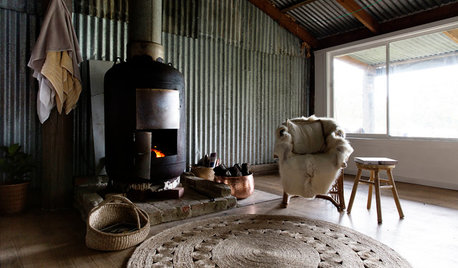Why Did You Become a Horticulturist?
Hi,
I'm set to get my University degree in horticulture and I have been wrestling with a lot of doubts. I am not sure if horticulture is going to be a viable occupation (from a financial perspective) in the future. I mean, everything has become so mechanized and industrialized, fewer people are needed for the same task. With that, a lot of the fun and challenge has been taken out as well. If you think otherwise, I'd love to hear your views.
I went into this field because of my love for plants and gardening. Is that your reason too? If it's been some years since, do you regret choosing this career or are you happy with it?
Comments (27)
superphosphate
18 years agoYou can always do retail if you know the plants.
Few people are knowledgable.
Don't try non-profit botany (botanical garden) unless you are left wing.
I got into botany from arborist work when the take for workman's comp and insurance went over 50% for tree work.
Related Professionals
Middle Island Landscape Architects & Landscape Designers · Saint Louis Park Landscape Architects & Landscape Designers · West Chester Landscape Architects & Landscape Designers · Belmont Landscape Contractors · Hicksville Landscape Contractors · Indianapolis Landscape Contractors · Milton Landscape Contractors · New Braunfels Landscape Contractors · Ridgewood Landscape Contractors · West Haverstraw Landscape Contractors · East Norriton Landscape Contractors · Cambridge Driveway Installation & Maintenance · Fort Worth Driveway Installation & Maintenance · Milpitas Driveway Installation & Maintenance · Ocala Driveway Installation & Maintenancegardengal48 (PNW Z8/9)
18 years agoThere are so many activities a background as a horticulturist can apply to that I don't believe your concern is necessary. I guess a lot of it would depend on your particular area of interest but propagation and hybridization will always be hands-on activities - it is only when it is being done for the mass market (after the initial development) that the process becomes very mechanized and clinical.
As for financial viability, that can certainly be an issue. This is not an industry associated with high incomes and great wealth. Most of us, like you, got in it because of our love for plants, gardening and the wonder of growing things - that we are able to scratch a living out of it is a bonus. If you wanted to make pots of money, perhaps you should have majored in AI or another up and coming techno field? :-)
Ron_B
18 years agoEven Bill Gates spent a long time running the company before getting to the point where he felt comfortable sharing the reins, enabling him to concentrate on the fun stuff. There ARE some millionaire nurserymen as well, but, likewise, being good at building and keeping a large business would be more important than what the particular product was. It's work before play at all levels - not that I've ever followed that rule, myself (and not that I have alot of money to play with, either).
AgastacheMan
18 years agoLet me ask this. Did it take you, Dr. Horticulture, only till now to think that horticulture may not be a viable option to you, money wise and wealth, being so far into your degree? Sounds like your hobbyist feelings came before idealistic thinking on a business front. I studied horticulture, botany and hort.science from a young age not just for a love of plants, but for the science, teaching, biology, and the want to improve the field in anyway possible to benefit not just me, but the whole shabang. The great aspect of horticulture is that you can still learn, re-learn, educate, and only increase your knowledge of a field and study that does influence many other businesses whether it be technology, science, biology, chemistry, human development, ecosystem development and upkeep, and health toward the animal kingdoms and the planet itself. So many people that complain about the money thing, which is the wrong approach, shouldn't even think about diluting the field with the wrong ideas and missed prospects of possible profit making. And, to respond to the mechanized and clinical aspects, horticulture as a whole is not that far gone. There are many mom/pop/family, independents, and small businesses that range from little and unique, to big and commercial, without the contracting approach to Home Depot, Lowes, and Wal-Mart. So, if one is to approach the business of horticulture with the attitude that the field is not viable because of big bussiness ethics that do not attend to your beliefs, then I say to anyone that you better quit before you try. If you try, complain, get disgusted, and quit, then you will enventually see the global takeover of genuine nurseries. Genuine nurseries that care for quality, proper education, proper cultivation and production, and most importantly, proper etiquette while preforming duties for customer service.
SO, with that long rambling of info, I say to you, Dr. Horticulture, and everyone that presents the question of " Is this field viable", sit down, ask yourself if money is the only objective while working in the green industry? If it is, turn around and save yourself the trouble. There is much more to the world of horticulture than providing one solution to money making. In all, I say to everyone else that owns, works for, deals with, and sells to small businesses, RISE AGAINST CORPORATE IGNORANCE AND BRUTE-FORCE BUSINESS ETHICS, AND FORM AN ALLIANCE OF SMALL GREEN BUSINESSES THAT SUPPORT AND LOOK AFTER ANOTHER! This will result, with everyones cooperation, the dissolve of corporate greed, and will make the independents flourish the market the way it needs to be.GreenieBeanie
18 years ago"Don't try non-profit botany (botanical garden) unless you are left wing."
Why do you have to be left wing to work at a botanical garden?
laag
18 years agoYes, it is viable. I think it is now more than ever for the very reasons that some point at to say it is not.
Because of mechanization, ease of entry to many aspects of the diverse field, and many, many untrained or under trained people working in it, there is a high value for people who know what they are doing. It is more of a niche market than it used to be. You can not compete with the hacks, nor can you afford to adopt their methods if you don't want to join them.
Seek only the work that takes brains, effort, education, and training. It will keep you focused and network you toward those that value those skills. You have to be in front of the door in order to put your foot in it (it being the doorway in this case).
You won't be valued by the masses, but if you are in the right place with the right background, you will find plenty who will value you a lot. Just read how many posts people put up about their disaappointment with "professionals" whom they have hired. The key is not to follow the hacks because they will only lead you to those that are looking for what they do. Work for those that do what you would like to do and have a hope of doing.
watergal
18 years agoDrH, I actually did get into horticulture because of my love for plants and gardening! I got an Economics degree because my dad said it was practical and I worked at a bank for several years and hated it. Money was good but I was miserable. Then I mucked around at some "junk jobs" for a while part-time while raising my daughter.
My gardening bug got so bad that gardening for hours in the summer and reading gardening books for hours in the winter became a way of life. My daughter pronounced me "garden obsessed". I decided since I was out of room for more plants on our property, it was time to venture into the field professionally where I could find more plants to tend.
Several years later, I don't regret it at all. I love what I do. My current boss, when describing my salary potential, said, "You'll make a decent living, but you ain't never gonna get rich." It's true. But for me, the tradeoff is worth it. It helps a lot that I have a husband with a good salary and benefits.
Incidentally, National Public Radio had a fascinating segment on "outsourcing" the other day, focusing on industries such as computers moving overseas. Their experts encouraged young people to aim for fields where you needed to be local, such as design/service industries. Although they didn't specifically list it, sure sounds like horticulture to me. No one located in India is going to man a help desk to ID the bug on someone's tree, or visit their fancy corporate office to design and maintain the interior plants, or drop by to water the landscape beds.
mylu
18 years ago"AgastacheMan"
RISE AGAINST CORPORATE IGNORANCE AND BRUTE-FORCE BUSINESS ETHICS, AND FORM AN ALLIANCE OF SMALL GREEN BUSINESSES THAT SUPPORT AND LOOK AFTER ANOTHER!Lets just say we all did this. We would be huge. Correct?
Wouldn't "WE" be the corporation?landman41
18 years ago""AgastacheMan"
RISE AGAINST CORPORATE IGNORANCE AND BRUTE-FORCE BUSINESS ETHICS, AND FORM AN ALLIANCE OF SMALL GREEN BUSINESSES THAT SUPPORT AND LOOK AFTER ANOTHER!
Lets just say we all did this. We would be huge. Correct?
Wouldn't "WE" be the corporation?"I think WE would be called a co-op?:) Something I head farmers do:)
AgastacheMan
18 years agoMylu, not a corporation as a business sense, but a corporation of ideas. Like a co-op like landman41 said. And the reason I said that remark is to open the eyes of the frustrated people that eventually bleed out from corporate America takeovers, or hesitate when they ponder the question " Is hroticulture going to be a viable plan"?. This leads to the question: Would you rather shop at a couple of nurseries that care about customer service, quality of plant cultivation, educating the worker and giving quality information back to the customer, and the willingness to better the landscape of the customer, or would you rather shop at a institution that pallet-buys there plants, represents little or no education, exhibits non-constructive customer service, and presents itself as just a money maker? If you answer yourself this question, the remainder will show you if you support the "mechanical, clinical, and box store method", or the small green industry....
DrHorticulture_
Original Author18 years agoThanks for all the comments. AgastacheMan, I would definitely support the 'green industry' any day. I just don't know how well I can extend my support if I'm barely able to scrape by myself as a hortculturist myself. To tell you the truth, this was something where I followed my instinct rather than anything else. I just didn't want a career that I would perpetually dislike.
inkognito
18 years agoWhy?
I am not sure that horticulture is an industry as such, certainly anyone who feels compelled to follow this path will need to be industrious, but if the reward you are looking for is of the monetary kind only, then you have gone down the wrong path.
I have employed people with a degree in horticulture that does not amount to a few months of working in the field. People are keen to get a qualification in the hope that they can, either make the same money as they would in real industry or so that they can indulge in their love of plants without the physical work that entails.
My father was a gardener and I hated the way the people he worked for treated him (making me left wing I guess) but it was in my blood and I wanted people to respect the work for what it is. I am not a gardener I am an horticulturist, a designer, a landscape architect. I am a gardener. The day you say this with pride is when the knowledge contained within your experience, including your degree speaks for itself.AgastacheMan
18 years agoInKognito, interesting, very interesting. You say you are not a gardener, but a horticulturalist, a designer, and a landscape architect. But then you say you are a gardener. Bit confused, but no need to clarify, I know where you are coming from. And second, horticulture is industry, whether it be obtaining plastic for processing pots and flats that are then used for plant growing and propagating, growing corn to produce corn gluten selective preemergent, chemically producing growth inhibitors, fertilizers, growth enhancers, fungicides, pesticides, herbicides, and a industry that provides tissue culture for benchmark annuals to field grown superior perennials that provides a haven for uses such as commercial landscape, privatized landscapes, federal and state park restoration, waste-water treatment and underground water filtering due to tree farming of poplars, alders and so on. So you see, it is not just a pot grown lupine that stands above all to say that horticulture is not a industry. call it what you will, but if a field provides and requires many tools and services to execute a way of business, than you have to see it is not just a little operation. So, maybe some of us live in a corner of the world that does not experience horticulture as a huge provider of services, but we definately reap the benefits when we see our products sell due to the compilation of helping factors that are tied into the green industry...
lnscapr
18 years agoLike many on this site, I suspect, I developed a passion/hobby into a career/business. At age 40 I went back to school for a certification in Landscape Design and after l4 years of hard work and the good luck to live in a rapidly growing, upscale area I have a successful small business as an independent landscape designer. (successful=small but regular paycheck 12 months each year, an office out of the house, and loving every minute of what I do! )
There are many niches in this field...in my area there is a serious lack of trained professionals to maintain landscapes after installation. I'm certain that a "professional gardener" with solid knowledge of plant care, pruning, and basic design and some good marketing skills could charge upwards of $50 per hour or more and be as busy as he/she would want to be.bruggirl
18 years agoMy first day in the Horticulture program, my first class was "Introduction to Horticulture". Our instructor, who was also the head of the department, said "If you want to get rich, leave now." No one left. Then he said "If you don't want to be wet, cold, hot, dirty, exhausted, and frustrated, leave now." No one left.
That pretty much sums up a career in horticulture. You are generally low middle income, wet, cold, hot, dirty, exhausted, and frustrated. Even so, you are generally happier than any lawyer, doctor, or AI graduate ever was.
Go for it!
Ron_B
18 years agoI dunno: some of the people operating around here don't seem to be part of the rather low pay, unusually hard work scenario. Off the top of my head I can think of at least two operations where the principals get over 100 dollars per hour, have helpers to do much (most?) of the grunt work. These are design and build firms. Mothering a store or production facility would be different.
laag
18 years agoWhat ever the rest of the business world does, the hort industry does as well, although many times at a smaller scale. It exploits "undocumented workers" (also known as illegal aliens)(you could also call that outsourcing), it often uses workers under 18 years of age to operate machinery (OSHA does not allow the use of lawn mowers by under 18), burn increadible amounts of fossil fuels for many jobs that can be done with hand tools, add to nitrogen loading, over use pesticides, work its help long hours with little or no benefits, and the list goes on.
Why does this seem to be such a noble industry? We only see what we want to see.
AgastacheMan
18 years agoLaag, noble industry? Obviously you are against the industry as a whole, since you replied with scorn about the laboring practices of a few. My end of the stick creates a supply and demand only worked by cared employees, so by making a statement generalizing the horticulture industry is the same as my way of business, that is not right. I defend the honest and NOBLE businessman, not the exploitation that is practiced by the bankrolled suit. Any industry, business, and service has the bad apples of the bunch, but to take the extreme and say that the green industry is not noble, you need to rethink your opinion and get your arguement straight.
laag
18 years agoOh, I don't characterize the whole industry that way except to counter the stereotype of it being a pure or somehow an opposite to big business. It is like any other business there are noble men as well as crooks. I just thought I'd remind us that whatever we find in any "industry" we can find in ours.
There are people that are seen as lowball scum of the earth who have no right to be in business in one man's eye who is embraced as someone who provides affordable services in someone else's.
It is the same everywhere, with any peoples, in any endeavor. It is a diverse world and we can try to pretend it is just the way we would like it to be, or accept the reality of it.
There are the same proportion of great people in the green industry as in anything else. There are the same pitfalls, temptations, obstacles, glory and embarassment also.
I see lots of unbankrolled landscapers, gardeners, nurserymen and designers practice exploitation of little old lady clients, undocumented workers, young workers, and women. It is not just a suit thing.
As a matter of fact, in our newspaper today, the headline was made by a garden designer in Falmouth, MA. No, she did not win the nobel prize for self sacrificing her body in long ours gardening. She got busted for running a multi-state prostitution ring. You could spin that to say she provided a service to those in need since she is in the green industry. If she were a suit, you could call her an exploiter of women and desperate weak pitiful men. It is all a matter of perspective. Yes, this is a true story
Here is a link that might be useful: Its twooo
auhort1990
18 years agoI became interested in high school. We had a horticulture class and I loved it. But when I started college I tried to do other things. My uncle is an accoutant, so I took an accouting class...hated it. I thought "well what about engineering"...whoa! I would have never made it through all the math. So then I thought, "you know I really liked my hort classes in high school". I took my Intro to Hort. class and was still unsure (not a very good professor for that class). But then I took my first I.D. class and that was it. I was hooked (Great Professor for this class). I haven't looked back since. No, I do not make tons of money but I love my job. Money isn't everything. You can make millions in a job you hate. I would rather stay where I am and be happy.
mylu
18 years agoThe wife read this one:
"That pretty much sums up a career in horticulture. You are generally low middle income, wet, cold, hot, dirty, exhausted, and frustrated. Even so, you are generally happier than any lawyer, doctor, or AI graduate ever was."I hate the cold but I always seem to be in it getting next years crop sown.
Now the wife wants to be a lawyer, doctor.....and I love being dirty. Go figure.
maurice_in_scotland
18 years agoI feel I must add my piece as an English gardener working in Scotland. I am Head Gardener/Property Manager at Arduaine Garden in Argyll, have been for 13 years and a similar post elsewhere previously for 16 years. The pay is not good, the hours are long, the midges are terrible, it rains half the time and blows a gale the other half as we're on the coast but we have a garden full of wonderful plants of all kinds. Every day visitors come up to say how much they have enjoyed the garden, some say it's the best garden they've ever seen (we don't really believe them but it's good of them to say it) and when all the maddenia rhododendrons are in flower on a moist evening in May there's nowhere like it! Basically I love growing plants in a wonderful area and if I can't afford to travel the world on my salary that's too bad, though with some financial assistance I have managed to visit Nepal twice and am in the process of planning a trip to Chile. The world is full of like-minded people who want to talk and trade plants without any thought of profit. These are some of the reasons why I became a horticulturist, or a gardener as I prefer to call myself.
Call in if you're over!
Cheers,
Maurice.
ilima
18 years agoI became a horticulturist because it was in my blood. Both my parents and both sets of grandparents were avid gardeners. It was what they did in their spare time and as a child I grew up in gardens and the woods of North Florida. I got my AA degree and still had no clue what I wanted to major in so I moved to Colorado and became a waiter at a country club where I met one of the gardeners who tended the landscape not the fairways when I was dumping ice from the shrimp buffet into the shrubs off the deck in the early spring and he objected and explained why. It just dawned on me that was what I was supposed to get my BS degree in. I had to party and ski a bit first and then move back home again but I did get my degree from the University of Florida in Gainesville.
I knew it was not going to be a big money career but I also knew I could not work in any kind of office type job. I needed to be outside and to be honest away from people. What it has allowed me is to be successfully self-employed for the last 18 years. I have never advertised and all my work comes from referral. My business is essentially me and one helper. I have never made any effort to hire a big crew and get tons of accounts. My perfectionist nature would cause me to implode trying to keep all that together.
The money part, yes I do have regrets, not having saved or bought my own home and living month to month. That has much more to do though with me being a lousy business man than the field I chose. I'd suggest, Dr. Horticulture, that if you are concerned about the money take a few business classes. I wish I had. I have seen plenty of people make plenty of money in the vast vast field that is Horticulture. More then anything it is a function of how much of a priority it is to you and the skills you have to make that happen. Even with my lower middle class life I do not regret the choice I made.
As I have gotten older and my body has begun to complain, money has taken on a new priority. For me getting sober was necesary before I could begin to realize the true value of the knowledge I have and to start charging what I was worth and get more selective about who I would work for and what I was willing to do. In just four years that has made a big difference in my income.
The simplest answer to your question though is you can make plenty money in the field of horticulture if you are a good business man as well.
ilima
















david4sale